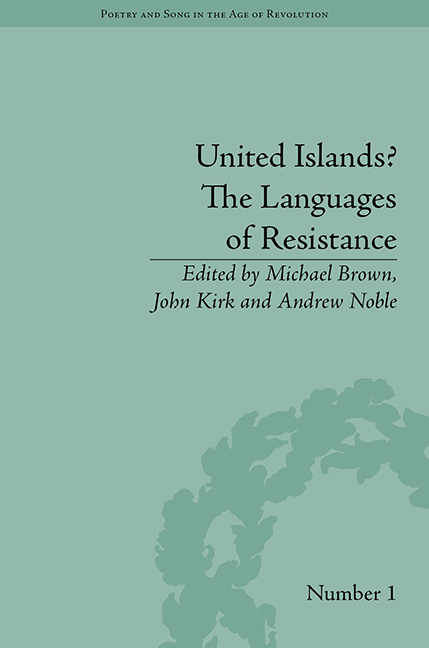Book contents
- Frontmatter
- CONTENTS
- Acknowledgements
- List of Figures and Tables
- List of Contributors
- Introduction: The Languages of Resistance: National Particularities, Universal Aspirations
- 1 Reading the English Political Songs of the 1790s
- 2 Why should the Landlords have the Best Songs? Thomas Spence and the Subversion of Popular Song
- 3 ‘Bard of Liberty’: Iolo Morganwg, Wales and Radical Song
- 4 Canonicity and Radical Evangelicalism: The Case of Thomas Kelly
- 5 Charlotte Brooke's Reliques of Irish Poetry: Eighteenth-Century ‘Irish Song’ and the Politics of Remediation
- 6 Homology, Analogy and the Perception of Irish Radicalism
- 7 Lost Manuscripts and Reactionary Rustling: Was there a Radical Scottish Gaelic Poetry between 1770 and 1820?
- 8 Virile Vernaculars: Radical Sexuality as Social Subversion in Irish Chapbook Verse, 1780–1820
- 9 Thomas Moore and the Problem of Colonial Masculinity in Irish Romanticism
- 10 Radical Politics and Dialect in the British Archipelago
- 11 ‘Theaw Kon Ekspect No Mooar Eawt ov a Pig thin a Grunt’: Searching for the Radical Dialect Voice in Industrial Lancashire and the West Riding, 1798–1819
- Afterword: The Languages of Resistance
- Notes
- Works Cited
- Index
Afterword: The Languages of Resistance
- Frontmatter
- CONTENTS
- Acknowledgements
- List of Figures and Tables
- List of Contributors
- Introduction: The Languages of Resistance: National Particularities, Universal Aspirations
- 1 Reading the English Political Songs of the 1790s
- 2 Why should the Landlords have the Best Songs? Thomas Spence and the Subversion of Popular Song
- 3 ‘Bard of Liberty’: Iolo Morganwg, Wales and Radical Song
- 4 Canonicity and Radical Evangelicalism: The Case of Thomas Kelly
- 5 Charlotte Brooke's Reliques of Irish Poetry: Eighteenth-Century ‘Irish Song’ and the Politics of Remediation
- 6 Homology, Analogy and the Perception of Irish Radicalism
- 7 Lost Manuscripts and Reactionary Rustling: Was there a Radical Scottish Gaelic Poetry between 1770 and 1820?
- 8 Virile Vernaculars: Radical Sexuality as Social Subversion in Irish Chapbook Verse, 1780–1820
- 9 Thomas Moore and the Problem of Colonial Masculinity in Irish Romanticism
- 10 Radical Politics and Dialect in the British Archipelago
- 11 ‘Theaw Kon Ekspect No Mooar Eawt ov a Pig thin a Grunt’: Searching for the Radical Dialect Voice in Industrial Lancashire and the West Riding, 1798–1819
- Afterword: The Languages of Resistance
- Notes
- Works Cited
- Index
Summary
In 1792, the Belfast Harpers’ Society, an association dedicated to the preservation of traditional harp music, held a three-day festival. One Welsh harper and ten Irish harpers (six of them blind) competed against one another in playing the most beautiful parts of the repertoires (which were simultaneously transcribed by nineteen-year-old Edward Bunting, later to edit an influential, multi-volume anthology of Irish traditional music). Festival organizer Henry Joy McCracken had also helped found the United Irishmen Society the year before – and the Harp Festival was timed to overlap in Belfast with a major political convention that drew 6,000 Irish Volunteers and United Irishmen. Framing the harpers’ performances were debates on Catholic Emancipation, processions, toasts to the Rights of Man and the fall of the Bastille.
Wolfe Tone attended some of the harp performances, but was not impressed: ‘July 11th. All go to the Harpers … poor enough; ten performers; seven execrable … No new musical discovery … July 13th. The Harpers again. Strum, strum and be hanged.’
Yet today the festival is remembered not only as an important ancestor of the modern folk festival, but as a crucial, if transient, conjuncture between cultural and political nationalism. In the festival's wake, indeed, the United Irishmen adopted the harp as their emblem, and the motto ‘It is New Strung and Shall be Heard’.
Musicians, scholars, radicals: some 200 years after the Belfast Festival, academics from across the Anglophone world, antiquaries and practicing musicians from various parts of Britain once again gathered in Belfast to hear both scholarly papers and musical performances. In the intervening centuries, both English and history had become established academic disciplines – and now the academics outnumbered the performers many times over.
- Type
- Chapter
- Information
- United Islands?The Languages of Resistance, pp. 195 - 206Publisher: Pickering & ChattoFirst published in: 2014

